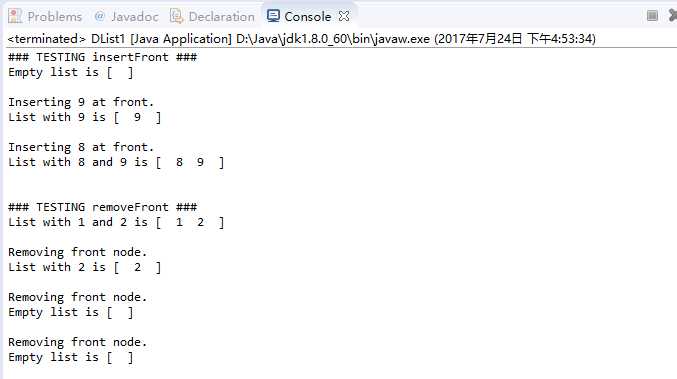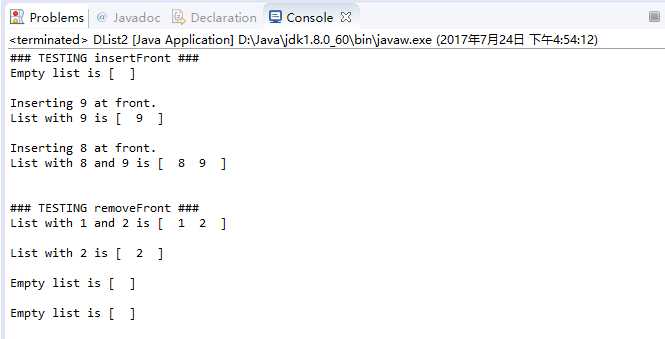标签:while solution min value ble ext hat log str
本周任务:
1.lecture10、11、12、13
2.lab4&hw4
3.pj1尽量
7.24
lecture10完成
lab4打卡:
DList1:
/* DList1.java */ /** * A DList1 is a mutable doubly-linked list. (No sentinel, not * circularly linked.) */ public class DList1 { /** * head references the first node. * tail references the last node. * * DO NOT CHANGE THE FOLLOWING FIELD DECLARATIONS. */ protected DListNode1 head; protected DListNode1 tail; protected long size; /* DList1 invariants: * 1) head.prev == null. * 2) tail.next == null. * 3) For any DListNode1 x in a DList, if x.next == y and x.next != null, * then y.prev == x. * 4) For any DListNode1 x in a DList, if x.prev == y and x.prev != null, * then y.next == x. * 5) The tail can be accessed from the head by a sequence of "next" * references. * 6) size is the number of DListNode1s that can be accessed from the * head by a sequence of "next" references. */ /** * DList1() constructor for an empty DList1. */ public DList1() { head = null; tail = null; size = 0; } /** * DList1() constructor for a one-node DList1. */ public DList1(int a) { head = new DListNode1(); tail = head; head.item = a; size = 1; } /** * DList1() constructor for a two-node DList1. */ public DList1(int a, int b) { head = new DListNode1(); head.item = a; tail = new DListNode1(); tail.item = b; head.next = tail; tail.prev = head; size = 2; } /** * insertFront() inserts an item at the front of a DList1. */ public void insertFront(int i) { DListNode1 NewNode=new DListNode1(i); NewNode.next=head; head=NewNode; size++; if(size==1) { tail=head; tail.prev=null; }else if(size==2) { tail.prev=head; } // Your solution here. } /** * removeFront() removes the first item (and node) from a DList1. If the * list is empty, do nothing. */ public void removeFront() { // Your solution here. if(size!=0) { if(size==1) { head=null; tail=null; }else if(size==2) { head.prev=null; head.next=null; tail.next=null; tail.prev=null; head=tail; } size--; } } /** * toString() returns a String representation of this DList. * * DO NOT CHANGE THIS METHOD. * * @return a String representation of this DList. */ public String toString() { String result = "[ "; DListNode1 current = head; while (current != null) { result = result + current.item + " "; current = current.next; } return result + "]"; } public static void main(String[] args) { // DO NOT CHANGE THE FOLLOWING CODE. DList1 l = new DList1(); System.out.println("### TESTING insertFront ###\nEmpty list is " + l); l.insertFront(9); System.out.println("\nInserting 9 at front.\nList with 9 is " + l); if (l.head == null) { System.out.println("head is null."); } else { if (l.head.item != 9) { System.out.println("head.item is wrong."); } if (l.head.prev != null) { System.out.println("head.prev is wrong."); } } if (l.tail == null) { System.out.println("tail is null."); } else { if (l.tail.item != 9) { System.out.println("tail.item is wrong."); } if (l.tail.next != null) { System.out.println("tail.next is wrong."); } } if (l.size != 1) { System.out.println("size is wrong."); } l.insertFront(8); System.out.println("\nInserting 8 at front.\nList with 8 and 9 is " + l); if (l.head == null) { System.out.println("head is null."); } else { if (l.head.item != 8) { System.out.println("head.item is wrong."); } if (l.head.prev != null) { System.out.println("head.prev is wrong."); } if (l.head.next != l.tail) { System.out.println("head.next is wrong."); } } if (l.tail == null) { System.out.println("tail is null."); } else { if (l.tail.item != 9) { System.out.println("tail.item is wrong."); } if (l.tail.next != null) { System.out.println("tail.next is wrong."); } if (l.tail.prev != l.head) { System.out.println("tail.prev is wrong."); } } if (l.size != 2) { System.out.println("size is wrong."); } l = new DList1(1, 2); System.out.println("\n\n### TESTING removeFront ###\nList with 1 and 2 is " + l); l.removeFront(); System.out.println("\nRemoving front node.\nList with 2 is " + l); if (l.head.item != 2) { System.out.println("head.item is wrong."); } if (l.head.prev != null) { System.out.println("head.prev is wrong."); } if (l.tail.item != 2) { System.out.println("tail.item is wrong."); } if (l.tail.next != null) { System.out.println("tail.next is wrong."); } if (l.size != 1) { System.out.println("size is wrong."); } l.removeFront(); System.out.println("\nRemoving front node.\nEmpty list is " + l); if (l.head != null) { System.out.println("head is wrong."); } if (l.tail != null) { System.out.println("tail is wrong."); } if (l.size != 0) { System.out.println("size is wrong."); } l.removeFront(); System.out.println("\nRemoving front node.\nEmpty list is " + l); if (l.head != null) { System.out.println("head is wrong."); } if (l.tail != null) { System.out.println("tail is wrong."); } if (l.size != 0) { System.out.println("size is wrong."); } } }
运行结果:

DList2:
/* DList2.java */ /** * A DList2 is a mutable doubly-linked list. Its implementation is * circularly-linked and employs a sentinel (dummy) node at the head * of the list. */ public class DList2 { /** * head references the sentinel node. * * DO NOT CHANGE THE FOLLOWING FIELD DECLARATIONS. */ protected DListNode2 head; protected long size; /* DList2 invariants: * 1) head != null. * 2) For any DListNode2 x in a DList2, x.next != null. * 3) For any DListNode2 x in a DList2, x.prev != null. * 4) For any DListNode2 x in a DList2, if x.next == y, then y.prev == x. * 5) For any DListNode2 x in a DList2, if x.prev == y, then y.next == x. * 6) size is the number of DListNode2s, NOT COUNTING the sentinel * (denoted by "head"), that can be accessed from the sentinel by * a sequence of "next" references. */ /** * DList2() constructor for an empty DList2. */ public DList2() { head = new DListNode2(); head.item = Integer.MIN_VALUE; head.next = head; head.prev = head; size = 0; } /** * DList2() constructor for a one-node DList2. */ public DList2(int a) { head = new DListNode2(); head.item = Integer.MIN_VALUE; head.next = new DListNode2(); head.next.item = a; head.prev = head.next; head.next.prev = head; head.prev.next = head; size = 1; } /** * DList2() constructor for a two-node DList2. */ public DList2(int a, int b) { head = new DListNode2(); head.item = Integer.MIN_VALUE; head.next = new DListNode2(); head.next.item = a; head.prev = new DListNode2(); head.prev.item = b; head.next.prev = head; head.next.next = head.prev; head.prev.next = head; head.prev.prev = head.next; size = 2; } /** * insertFront() inserts an item at the front of a DList2. */ public void insertFront(int i) { DListNode2 NewNode=new DListNode2(i); NewNode.prev=head; NewNode.next=head.next; head.next=NewNode; head.next.next.prev=NewNode; size++; // Your solution here. } /** * removeFront() removes the first item (and first non-sentinel node) from * a DList2. If the list is empty, do nothing. */ public void removeFront() { head.next=head.next.next; head.next.prev=head; if(size!=0) { size--; } // Your solution here. } /** * toString() returns a String representation of this DList. * * DO NOT CHANGE THIS METHOD. * * @return a String representation of this DList. */ public String toString() { String result = "[ "; DListNode2 current = head.next; while (current != head) { result = result + current.item + " "; current = current.next; } return result + "]"; } public static void main(String[] args) { // DO NOT CHANGE THE FOLLOWING CODE. DList2 l = new DList2(); System.out.println("### TESTING insertFront ###\nEmpty list is " + l); l.insertFront(9); System.out.println("\nInserting 9 at front.\nList with 9 is " + l); if (l.head.next.item != 9) { System.out.println("head.next.item is wrong."); } if (l.head.next.prev != l.head) { System.out.println("head.next.prev is wrong."); } if (l.head.prev.item != 9) { System.out.println("head.prev.item is wrong."); } if (l.head.prev.next != l.head) { System.out.println("head.prev.next is wrong."); } if (l.size != 1) { System.out.println("size is wrong."); } l.insertFront(8); System.out.println("\nInserting 8 at front.\nList with 8 and 9 is " + l); if (l.head.next.item != 8) { System.out.println("head.next.item is wrong."); } if (l.head.next.prev != l.head) { System.out.println("head.next.prev is wrong."); } if (l.head.prev.item != 9) { System.out.println("head.prev.item is wrong."); } if (l.head.prev.next != l.head) { System.out.println("head.prev.next is wrong."); } if (l.head.next.next != l.head.prev) { System.out.println("l.head.next.next != l.head.prev."); } if (l.head.prev.prev != l.head.next) { System.out.println("l.head.prev.prev != l.head.next."); } if (l.size != 2) { System.out.println("size is wrong."); } l = new DList2(1, 2); System.out.println("\n\n### TESTING removeFront ###\nList with 1 and 2 is " + l); l.removeFront(); System.out.println("\nList with 2 is " + l); if (l.head.next.item != 2) { System.out.println("head.next.item is wrong."); } if (l.head.next.prev != l.head) { System.out.println("head.next.prev is wrong."); } if (l.head.prev.item != 2) { System.out.println("head.prev.item is wrong."); } if (l.head.prev.next != l.head) { System.out.println("head.prev.next is wrong."); } if (l.size != 1) { System.out.println("size is wrong."); } l.removeFront(); System.out.println("\nEmpty list is " + l); if (l.head.next != l.head) { System.out.println("head.next is wrong."); } if (l.head.prev != l.head) { System.out.println("head.prev is wrong."); } if (l.size != 0) { System.out.println("size is wrong."); } l.removeFront(); System.out.println("\nEmpty list is " + l); if (l.head.next != l.head) { System.out.println("head.next is wrong."); } if (l.head.prev != l.head) { System.out.println("head.prev is wrong."); } if (l.size != 0) { System.out.println("size is wrong."); } } }
运行结果:

标签:while solution min value ble ext hat log str
原文地址:http://www.cnblogs.com/x1mercy/p/7229818.html